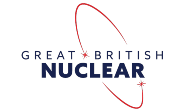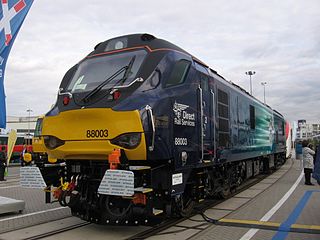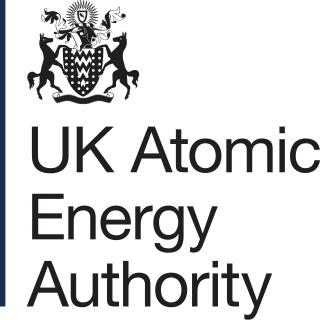
An armed merchantman is a merchant ship equipped with guns, usually for defensive purposes, either by design or after the fact. In the days of sail, piracy and privateers, many merchantmen would be routinely armed, especially those engaging in long distance and high value trade.

Sellafield, formerly known as Windscale, is a large multi-function nuclear site close to Seascale on the coast of Cumbria, England. As of August 2022, primary activities are nuclear waste processing and storage and nuclear decommissioning. Former activities included nuclear power generation from 1956 to 2003, and nuclear fuel reprocessing from 1952 to 2022.

Magnox is a type of nuclear power / production reactor that was designed to run on natural uranium with graphite as the moderator and carbon dioxide gas as the heat exchange coolant. It belongs to the wider class of gas-cooled reactors. The name comes from the magnesium-aluminium alloy, used to clad the fuel rods inside the reactor. Like most other "Generation I nuclear reactors", the Magnox was designed with the dual purpose of producing electrical power and plutonium-239 for the nascent nuclear weapons programme in Britain. The name refers specifically to the United Kingdom design but is sometimes used generically to refer to any similar reactor.

Great British Nuclear, officially British Nuclear Fuels Ltd is a nuclear energy and fuels company owned by the UK Government. It is a non-departmental public body sponsored by the Department for Energy Security and Net Zero.

Direct Rail Services (DRS) is a rail freight company in Great Britain, and is one of the publicly owned railway companies in the United Kingdom.

The United Kingdom Atomic Energy Authority is a UK government research organisation responsible for the development of fusion energy. It is an executive non-departmental public body of the Department for Energy Security and Net Zero (DESNZ).

Dounreay is a small settlement and the site of two large nuclear establishments on the north coast of Caithness in the Highland area of Scotland. It is on the A836 road nine miles west of Thurso.

Chapelcross nuclear power station is a former Magnox nuclear power station undergoing decommissioning. It is located in Annan in Dumfries and Galloway in southwest Scotland, and was in operation from 1959 to 2004. It was the sister plant to the Calder Hall nuclear power station plant in Cumbria, England; both were commissioned and originally operated by the United Kingdom Atomic Energy Authority. The primary purpose of both plants was to produce weapons-grade plutonium for the UK's nuclear weapons programme, but they also generated electrical power for the National Grid. Later in the reactors' lifecycle, as the UK slowed the development of the nuclear deterrent as the cold war came to a close, power production became the primary goal of reactor operation.

The Civil Nuclear Constabulary (CNC) is a special police force responsible for providing law enforcement and security at any relevant nuclear site and for security of nuclear materials in transit within the United Kingdom. The force has over 1,500 police officers and support staff. Officers within the force are authorised firearms officers due to the nature of the industry the force protects.

The Nuclear Decommissioning Authority (NDA) is a non-departmental public body of the Department for Energy Security and Net Zero formed by the Energy Act 2004. It evolved from the Coal and Nuclear Liabilities Unit of the Department of Trade and Industry. It came into existence during late 2004, and took on its main functions on 1 April 2005. Its purpose is to deliver the decommissioning and clean-up of the UK's civil nuclear legacy in a safe and cost-effective manner, and where possible to accelerate programmes of work that reduce hazard.
Sellafield Ltd is a British nuclear decommissioning Site Licence Company (SLC) controlled by the Nuclear Decommissioning Authority (NDA), a UK government body set up specifically to deal with the nuclear legacy under the Energy Act 2004. From 2008–2016, it was operated under licence from the NDA by a third party Parent Body Organisation called Nuclear Management Partners (NMP). Since the termination of the NMP contract it has been brought back under direct governmental control by making it a subsidiary of the NDA.

The Thermal Oxide Reprocessing Plant, or THORP, is a nuclear fuel reprocessing plant at Sellafield in Cumbria, England. THORP is owned by the Nuclear Decommissioning Authority and operated by Sellafield Ltd.
EnergySolutions, headquartered in Salt Lake City, Utah, is one of the largest processors of low level waste (LLW) in America, making it also one of the world's largest nuclear waste processors. It was formed in 2007 when Envirocare acquired three other nuclear waste disposal companies: Scientech D&D, BNG America, and Duratek.
Babcock International Group plc is a British aerospace, defence and nuclear engineering services company based in London, England. It specialises in managing complex assets and infrastructure. Although the company has civil contracts, its main business is with public bodies, particularly the United Kingdom's Ministry of Defence and Network Rail. The company has four operating sectors, with overseas operations based in Africa, North America, South America, Europe and Australia.
Nuclear Electric was a nuclear power generation company in the United Kingdom. It was formed in 1990 as part of the privatisation process of the UK Electricity Supply Industry.

A nuclear flask is a shipping container that is used to transport active nuclear materials between nuclear power station and spent fuel reprocessing facilities.
The National Nuclear Laboratory is a UK government owned and operated nuclear services technology provider covering the whole of the nuclear fuel cycle. It is fully customer-funded and operates at six locations in the United Kingdom. Its customers have included the Nuclear Decommissioning Authority, Sellafield Ltd, Westinghouse, the Health and Safety Executive, the Ministry of Defence, the UK Atomic Energy Authority, VT Nuclear and British Energy. It also has links with academia, including collaborative agreements on waste immobilisation and disposal with the University of Sheffield and on nuclear materials research with the University of Manchester.

Springfields is a nuclear fuel production installation in Salwick, near Preston in Lancashire, England. The site is currently operated by Springfields Fuels Limited, under the management of Westinghouse Electric UK Limited, on a 150-year lease from the Nuclear Decommissioning Authority. Since its conversion from a munitions factory in 1946, it has previously been operated and managed by a number of different organisations including the United Kingdom Atomic Energy Authority and British Nuclear Fuels. Fuel products are produced for the UK's nuclear power stations and for international customers.

The Port of Barrow refers to the enclosed dock system within the town of Barrow-in-Furness, England. Morecambe Bay is to the east of the port and the Irish Sea surrounds it to the south and west. The port is currently owned and operated by Associated British Ports Holdings, but some land is shared with BAE Systems Submarine Solutions. Currently consisting of four large docks, the Port of Barrow is one of North West England's most important ports. The docks are as follows: Buccleuch Dock, Cavendish Dock, Devonshire Dock and Ramsden Dock. The port of Barrow is the only deep water port between the Mersey and the Clyde.

Magnox Ltd, currently trading as Nuclear Restoration Services, is a wholly-owned subsidiary of the Nuclear Decommissioning Authority (NDA), responsible for the safe decommissioning of British nuclear sites. Originally created for the management of Magnox nuclear reactors, it went through various forms of organisation throughout privatisation of the nuclear industry, until coming into NDA ownership in 2019. It rebranded to NRS in October 2023.















